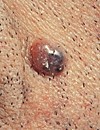
Diagnosed with Cancer? Your two greatest challenges are understanding cancer and understanding possible side effects from chemo and radiation. Knowledge is Power!
Learn about conventional, complementary, and integrative therapies.
Dealing with treatment side effects? Learn about evidence-based therapies to alleviate your symptoms.
Click the orange button to the right to learn more.
- You are here:
- Home »
- Blog »
- side effects ID and prevention »
- Epigenomic Changes Slow Melanoma
Epigenomic Changes Slow Melanoma

“Furthermore, when the researchers knocked out these proteins, the melanoma became much less aggressive and more receptive to existing cancer drugs.”
I don’t know what they mean when the article linked and excerpted below says that the researchers “knocked out these melanoma proteins.” But as a long-term cancer survivor who has lived in complete remission from an incurable cancer since 1999, I have a theory. BTW, I won’t be offended if you click away now because you could care less about my theory.
My theory is that I have remained in complete remission for so long now by changing how my genes express themselves. I do what the article below says that melanoma patients should do to themselves to reduce the aggressiveness of their cancer.
To be clear, both melanoma and my cancer, multiple myeloma, are incurable, potentially aggressive cancers. Conventional, standard-of-care, FDA approved chemotherapy regimens usually don’t do much for the patient beyond buying some time and causing short, long-term and late stage side effects.
Most importantly, I think people diagnosed with aggressive, often incurable cancers must utilize both conventional therapies as well as evidence-based integrative and complementary therapies as well.
I think all cancer patients do better by altering their genetic experession through nutrition, supplementation, lifestyle, etc. The good news is that alterning how one’s genes express themselves is pretty easy. Lifestyle therapies that cancer patients have been told to do such as eating nutritiously, exercising daily, even lifestyle changes such as learning how to handle stress has been shown to alter genetic expression and reduce the risk of cancer or reduce the risk of cancer relapse.
To Learn More about cancer genetics and epigenetic- click now
David Emerson
- Cancer Survivor
- Cancer Coach
- Director PeopleBeatingCancer
Recommended Reading:
- Could Probiotics Enhance the Efficacy of Immunotherapy for Melanoma?
- DCA (Dichloroacetate) and Advanced Melanoma-
Epigenomics
“Epigenetic modifications are reversible modifications on a cell’s DNA or histones that affect gene expression without altering the DNA sequence..”
Epigenomic changes play an important role during the progression of melanoma
“KU Leuven researchers have zeroed in on what makes cancer cells in melanoma so aggressive. They also succeeded in taming the effect in cell cultures. Melanoma, a type of skin cancer, is notoriously quick to metastasize and responds poorly to existing cancer treatments. In their study, published in Nature Communications, the researchers report a significant step forward in the characterization and potential treatment of melanoma.
Human DNA contains genetic information that makes our cells functional entities within a larger whole. The stream of information from DNA to function happens in the form of proteins that anchor themselves to various locations in the DNA and transcribe genetic information into functional cell parts. This process is strictly regulated and is thus very sensitive to change by external factors.
Such changes, called gene-regulatory or epigenomic changes, can alter the regular stream of information between the DNA and the cell without actually altering the DNA itself.
In their study, Professor Stein Aerts (KU Leuven) and Professor Chris Marine (VIB/KU Leuven) were able to confirm that epigenomic changes play an important role in the development and progression of melanoma.
Previous research has shown that melanomas are made up of various types of cells. Each subpopulation of cells in the tumour has different characteristics. What makes melanoma so aggressive, say the researchers, is the existence of a subpopulation that causes progression and metastasis of the cancer. These cells also increase the resistance of the tumour to current cancer drugs.
The researchers found that these subpopulations do not arise from mutations or errors in the DNA itself but are the result of changes in the stream of information from the DNA to the cell. In a first phase of cancer, specific proteins bind themselves to specific locations in the DNA, which allow the tumour to grow. In a second, more aggressive phase, other proteins are activated that bind to other DNA sites, which allow the cancer cells to invade and spread to other tissues in the body.
Professor Aerts and his team succeeded in mapping the epigenomic landscape in both phases of melanoma progression. They identified the proteins and the thousands of regions on the DNA to which the proteins bound themselves. Furthermore, when the researchers knocked out these proteins, the melanoma became much less aggressive and more receptive to existing cancer drugs.
This is the first complete epigenomic profile of melanoma and the first study to map the regulatory landscape of the different melanoma cell states.
The results contribute to a more complete picture of cancer cells during melanoma progression and constitute an important step forward in the search for more targeted, more effective therapies for this aggressive type of cancer.”


